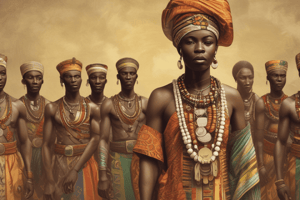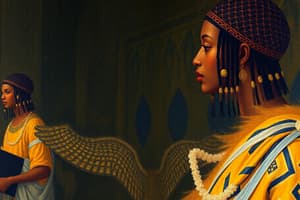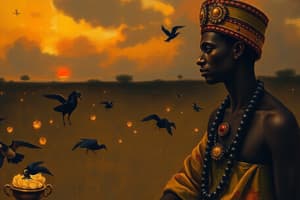Podcast
Questions and Answers
When did the whole of Southern Ghana, including Anloland, become a British colony?
When did the whole of Southern Ghana, including Anloland, become a British colony?
- 12th of September, 1876
- 12th of September, 1873
- 12th of September, 1875
- 12th of September, 1874 (correct)
Why was the Asantehene deported in 1896?
Why was the Asantehene deported in 1896?
- For strengthening his power over Asante
- For resisting British colonization (correct)
- For refusing to sign a friendship treaty
- For supporting the German colonization
What was the name of the territory that was shared between the British and the French after World War I?
What was the name of the territory that was shared between the British and the French after World War I?
- French Togoland
- German Togoland
- British Gold Coast
- British Mandated Togoland (correct)
What was the name of the region that was formed from the southern half of British Mandated Togoland?
What was the name of the region that was formed from the southern half of British Mandated Togoland?
When did Ghana gain political independence from Britain?
When did Ghana gain political independence from Britain?
What is the capital of the Greater Accra region?
What is the capital of the Greater Accra region?
How many administrative regions are there in Ghana?
How many administrative regions are there in Ghana?
What was the name of the colony that was formed from the merger of the Gold Coast Colony, Asante, and the Northern Territories?
What was the name of the colony that was formed from the merger of the Gold Coast Colony, Asante, and the Northern Territories?
What was the reason for the change of name from Gold Coast to Ghana?
What was the reason for the change of name from Gold Coast to Ghana?
Where did the early Akans settle when they arrived in modern Ghana?
Where did the early Akans settle when they arrived in modern Ghana?
What was the early name of the Akans?
What was the early name of the Akans?
Where did the Ga-Adangbe people come from?
Where did the Ga-Adangbe people come from?
Who were the earliest Europeans to arrive in the Gold Coast?
Who were the earliest Europeans to arrive in the Gold Coast?
What was built by the Portuguese in 1482 in the Gold Coast?
What was built by the Portuguese in 1482 in the Gold Coast?
What was the outcome of the British army's invasion of the Asante territory in 1874?
What was the outcome of the British army's invasion of the Asante territory in 1874?
What was the name of the fort built by the Dutch in 1642?
What was the name of the fort built by the Dutch in 1642?
What is the name of the largest hydro-electric plant in West Africa?
What is the name of the largest hydro-electric plant in West Africa?
In which year did Ghana adopt its current name?
In which year did Ghana adopt its current name?
What was the GDP of Ghana in 2015?
What was the GDP of Ghana in 2015?
What was the percentage of Ghana's population living below the national poverty line in 1992?
What was the percentage of Ghana's population living below the national poverty line in 1992?
What was the life expectancy at birth in Ghana in 2010?
What was the life expectancy at birth in Ghana in 2010?
What was the literacy rate of adults in Ghana in 2015?
What was the literacy rate of adults in Ghana in 2015?
What percentage of Ghana's rural population had access to improved water sources in 2015?
What percentage of Ghana's rural population had access to improved water sources in 2015?
What is Ghana's classification by the World Bank?
What is Ghana's classification by the World Bank?
Flashcards
1874
1874
Southern Ghana became a British colony.
Two years after colonization
Two years after colonization
Accra became the capital city of the British colony.
Deportation of Asantehene
Deportation of Asantehene
The British strengthened their power over Asante by exiling their leader.
Boundary Agreements
Boundary Agreements
Signup and view all the flashcards
March 6, 1957
March 6, 1957
Signup and view all the flashcards
Ghana's Regions
Ghana's Regions
Signup and view all the flashcards
Origin of the Akans
Origin of the Akans
Signup and view all the flashcards
Origin of Ga-Adangbe People
Origin of Ga-Adangbe People
Signup and view all the flashcards
Origin of Ewe People
Origin of Ewe People
Signup and view all the flashcards
Portuguese in Elmina (1482)
Portuguese in Elmina (1482)
Signup and view all the flashcards
Dutch Arrival (1598)
Dutch Arrival (1598)
Signup and view all the flashcards
Ghana's World Bank Classification
Ghana's World Bank Classification
Signup and view all the flashcards
Ghana's GNI Per Capita (2015)
Ghana's GNI Per Capita (2015)
Signup and view all the flashcards
Ghana's Adult Literacy Rate (2015)
Ghana's Adult Literacy Rate (2015)
Signup and view all the flashcards
Study Notes
Colonization and Independence
- Southern Ghana, including Anloland, became a British colony on September 12, 1874.
- The capital was moved from Cape Coast to Accra two years later.
- The British strengthened their power over Asante by deporting the Asantehene to the Seychelles Islands in 1896.
- The British signed friendship treaties with chiefs in the northern part of the country, referred to as the Northern Territories.
- The British, French, and Germans agreed on common boundaries, defining a box-like country called British Gold Coast.
Post-WWI and Independence
- After WWII, the British and French drove the Germans out of German Togoland and shared the territory between themselves.
- The part that came under British rule was called British Mandated Togoland, the southern half of which is now known as the Volta Region.
- Ghana gained political independence from Britain on March 6, 1957, and the name was changed from Gold Coast to Ghana.
Regions of Ghana
- Ghana is currently divided into 16 administrative regions:
- Ahafo - Goaso
- Ashanti - Kumasi
- Bono - Sunyani
- Bono East - Techiman
- Central - Cape Coast
- Eastern - Koforidua
- Greater Accra - Accra
- Northern - Tamale
- North East - Nalerigu
- Oti - Dambai
- Savanna - Damango
- Upper East - Bolgatanga
- Upper West - Wa
- Volta - Ho
- Western - Sekondi
- Western North - Sehwi Wiawso
Ethnic Groups and History
- The Akans are believed to have entered modern Ghana after wandering for some years, settling in an area in current-day Western Gonjaland.
- The Ga-Adangbe people are supposed to have arrived from Nigeria over 400 years ago.
- The Ewe people are supposed to have arrived from Nigeria or Benin after the Ga-Adangbe.
- Ga-Adangbe and people of northern Ghana, including the Moshie, Dagomba, Mamprusi, and Gonja, are said to have come originally from a country to the north or north-east of their present home in modern Ghana.
European Contact and Trade
- The Portuguese were the earliest Europeans to arrive in the 15th century, and they built the first castle in the Gold Coast at Elmina in 1482.
- The Dutch arrived in 1598 and built forts along the coastal areas, including the Komenda fort.
- Many other European traders, including the British, Danes, and Swedes, came to the Gold Coast to trade.
Socio-economic Facts
- Ghana is classified by the World Bank as a Lower Middle-Income country (2013).
- GDP: 37.86billion(2015),37.86 billion (2015), 37.86billion(2015),42.80 billion (2016).
- GNI per capita: $1,480 (2015).
- Poverty headcount at national poverty line (% of population): 50.0% (1992), 39.5% (1999), 28.5% (2006), 24.20 (2012).
- Life expectancy at birth (total years): 52.27 (1980), 56.75 (1990), 56.99 (2000), 60.92 (2010), 62.74 (2016).
- Literacy rate, adult total (% of people ages 15 and above): 76.6% (2015).
- Improved water source, rural (% of rural population with access): 84% (2015), 81% (2012), 79% (2011), 77% (2010), 75% (2009), 73% (2008).
Studying That Suits You
Use AI to generate personalized quizzes and flashcards to suit your learning preferences.




